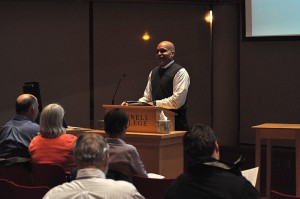By Kevin Hong
President Kington went green on Wednesday at two town hall meetings to discuss environmental issues.
Kington, along with Environmental & Safety Coordinato Chris Bair and other staff members, announced plans to create a new Environmental Steering Committee to organize environmental groups on campus and talked about the College’s environment and sustainability issues.

Kington called the meetings because last semester, several students and faculty came to the president’s open hours and brought up several environmental issues on campus.
“It was clear that there had not been an opportunity for the campus to hear a comprehensive view of what we’ve been doing in the broad area of sustainability, climate, and environment,” he said.
The College has committed to a series of environmental and sustainability related activities and, according to Kington, the Grinnell community should be informed about their progress.
“A lot of people want to know more, and there is more to know,” Kington said.
The wind turbine project, started in 1996, was the most discussed issue at the meetings. The venture would eliminate the campus’ dependency on non-renewable energy sources by building wind turbines to power campus.
The current plan is to build a 10 to 11 million dollar wind farm northeast of campus that would generate 80 percent of the campus’s electric consumption, cutting the college’s carbon emission in half, according to administrators.
“We are proceeding with developing the wind turbine project, and there are a number of complicated issues to be discussed,” Kington said. “In general, things are looking good. We are able to do this, but it may take time.”
Some students pressured the administration to start building the wind turbine project begins soon. It was first proposed 15 years ago. According to Kington, efforts are delayed as the administration raises funds and gets permission to run energy cables through private property.
“I think it’s a good idea to have more renewable energy so that we don’t need to use the energy from the companies,” said David Brown ’14, an active environmentalist on campus. “I hope it will happen soon, and I heard that many other colleges already have them, so I think it’s’ a good idea to follow.”
For Energy Consumption and Carbon Emissions, there has been a request that Kington sign the President’s Climate Commitment, which necessitates an emissions inventory within one year of signing, an implementation plan and schedule within two years of signing, and several other immediate actions.
Kington said he is concerned about restricting Grinnell’s ability to fund off-campus travel, which is environmentally costly as Grinnellians must travel by car and plane to reach most places.
During the meeting, Bair brought up several complaints that there has been a lack of strong coordinating among various groups on campus, such as Eco House, Eco-campus, Free the Planet, and others.
“We are trying to come up with a way for them to be more coordinated and one of them is to form a ‘Sustainability Steering Committee,’” Bair said.
Savannah Duby ’13, current leader of Free the Planet, believes that more cohesion among student groups is key.
“Basically everything we do depends on what sort of motivation or interest there is in the student group that we have,” Duby said. “Different groups have their own jobs, and it is important for us to be better coordinated.”
Kington agreed but placed the responsibility of community organizing on the student leaders.
“It’s really about community. Our community collectively deciding to be more thoughtful. That allows us to achieve our missions, and signals that we are being good citizens, with regard to stewardship of the environment,” Kington added.
The College will establish a web site for regular updates about the wind turbine project, and the environmental groups current activities, and other environmental information about the campus.
“I think having a website and having the Sustainability Committee could make sure that all the groups are on the same page about strategies and decisions,” Kington said. “There are lots of things we could do, we just have to think how we can do it, and try to find the incentive and tools to do it.”



















































